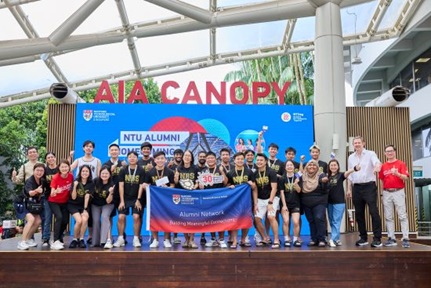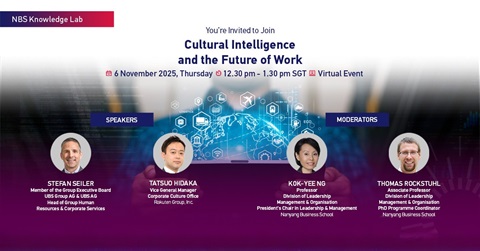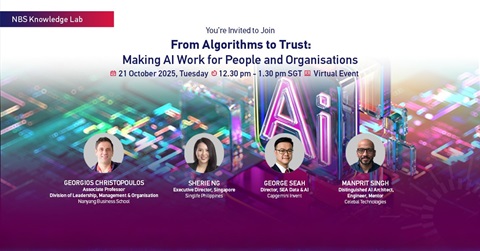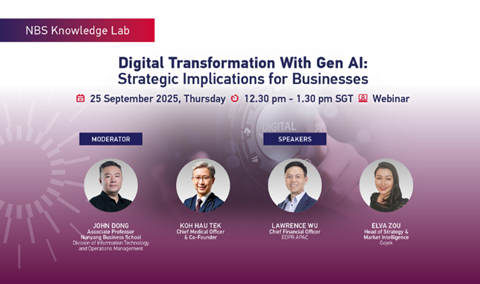The ESG Journey: Lessons from Three Companies
Whether an MNC or a young start-up, adopting ESG-strategies targeting a variety of social good can mean good news for businesses too in terms of profitability
On 26 May 2022, as part of the NBS Knowledge Lab webinar series, we held a webinar called “The ESG Journey: Lessons from Three Companies”. On it were panellists Mr Lau Jiacai, Co-Founder of TreeDots; Mr Jay Ng, CEO and Founder of WeShine; and Mr Helge Muenkel, Group Chief Sustainability Officer of DBS, who shared their behind-the-scenes experiences on ESG-related operations. The session was moderated by Dr Zhao Meng, Senior Lecturer, Nanyang Business School (NBS), Nanyang Technological University (NTU), Singapore.
The different ESG journeys
Of the three companies, WeShine, a career portal for those displaced by the pandemic and by technology, is at the earliest stage of the ESG journey. One of their current projects targets the problem of youth unemployment. For instance, in Indonesia, there are many digitally savvy youths who do not find work that match their skill sets. WeShine steps in to help these digital migrants find remote work and reduce labour friction.
TreeDots is a social e-commerce platform that mainly helps upstream importers redirect unsold inventories to other food businesses to reduce food wastage. In business for about five years, Mr Lau explained that TreeDots works with more upstream businesses (i.e., first-hand importers like slaughterhouses) rather than retail businesses because there is the risk of food safety with discarded food from the latter.
While there are many ways where food products can be repurposed, the biggest challenge TreeDots faces is that the food industry does not view donating products positively – a mindset that Mr Lau hopes will change with time.
For established organisations like DBS, ESG efforts largely involve allocating capital towards supporting more sustainable businesses, with the hope of inspiring ecosystem change.
The bank also works with clients actively to empower them to make changes to their business models towards more sustainable directions, in line with DBS’s three-pillar approach to sustainability – responsible banking, responsible business practices, and creating social impact.
DBS has sought to be transparent about what they do, publishing whitepapers on their selection processes, and embedding sustainability into all parts of their business to maximise ESG impact across the organisation.
So how do we start?
Start with an ESG-related priority
To answer how companies identify ESG-related priorities for their organisations and start on their ESG journeys, Mr Lau explained that TreeDots targeted the issue of food wastage as it was an area for which they thought they could provide solutions. It is important to first identify an ESG cause with the highest likelihood of success.
Mr Ng emphasised that all enterprises, if done well, should be social in nature. As such, new businesses like WeShine should think about how they can incorporate positive impact into their business models from the onset.
For larger firms like DBS, Mr Muenkel highlighted the importance of purpose. The idea that the purpose of a business is to create maximum shareholder value and cover some ESG in the process is outdated, with ESG now moving more into the foreground.
Cultivate the right mindset
Addressing pushbacks and obstacles, Mr Muenkel stated that there is an overall positive energy backed by strong corporate culture that supports the bank’s efforts towards ESG practices. This, he attributes to their leader, who sets the tone from the top.
Naturally, some people are not as willing to change, since they are being asked to adapt to new procedures and fundamentally alter the way they work.
However, there is also the general perception that businesses are either commercial or sustainable, so it is important to show that doing the right thing can be profitable too. Referring to many of DBS’s clients, Mr Muenkel emphasised how they have become more innovative by embracing sustainability.
While there is no single way of changing mindsets, some things DBS has worked on include capacity building. But Mr Muenkel emphasised that this is also about capturing the hearts of people, where context needs to be set, and sustainability goals incorporated into KPIs.
ESG is a continuous journey that begins with the way the company communicates with its staff.
Above all, start with purpose and passion
To a question on what advice would they give to teenagers seeking employment in ESG companies, Mr Lau noted that the young today seem more aware of social problems, demonstrating sensitivity towards topics like climate change. This early interest makes them employable in an ESG-invested company as the small steps can lead to bigger ones.
Mr Ng agreed, suggesting that there are no hard skills in this area. Teenagers need to be aware of the topic and be passionate.
Mr Muenkel highlighted the need to start with purpose. Teenagers need to discover ESG intrinsically and feel personally interested in it to make this their career as having the right mindset is crucial to the work.
Positive momentum in Asia
Mr Lau did not believe there is a right or wrong way in sustainable efforts as every country goes through different phases of growth, with different sets of social problems to address.
Most of Asia is not fully developed and individuals would, naturally, be more concerned with their own survival than sustainability. Mr Ng stresses that not all regions in Asia behave in the same manner. Taiwan, for example, views environmental issues seriously.
Clearly, economic factors also dominate this difference. Mr Muenkel highlighted that the wealthier nations would have more bandwidth to consider the problem of ESG than the rest.
Everyone has a different starting position but there has been positive momentum in Asia and things are looking hopeful here, he added.
*ESG (environmental, social and governance)
The Nanyang Executive Education at NBS currently offers two sustainability certificate programmes to support industry leaders and professionals:

.tmb-listing.png?Culture=en&sfvrsn=d48abb4_1)




